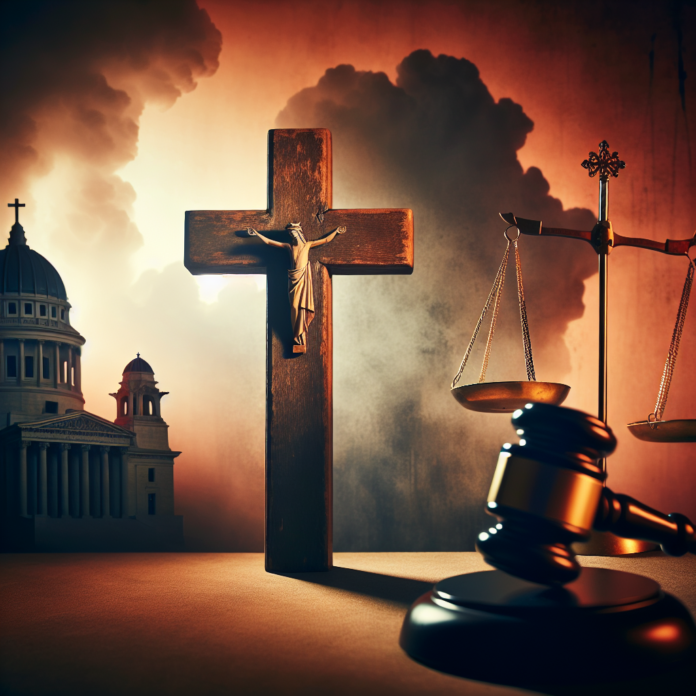Cross and Constitution: Why the Catholic Church Should Steer Clear of Governance
In the ever-evolving landscape of the 21st century, society faces a perennial question: what role should religion, particularly the Catholic Church, play in governance? This inquiry isn’t merely an academic exercise, but one that has far-reaching implications for countries around the globe. At the heart of this debate lies a tension between tradition and progress, one where the influence of the Catholic Church on political systems is both challenged and defended.
History reveals the profound impact the Catholic Church has wielded over governance. From the Roman Empire to the Holy Roman Empire, papal authority once seamlessly intertwined with the political machinations of kings and emperors. These eras, characterized by intense religious influence over secular rulers, embedded an ecclesiastical imprint on governance structures that spilled across continents. However, these historical entanglements were not without significant pitfalls, as the political aspirations of the Church often overshadowed spiritual stewardship.
Fast forward to the present, where sweeping societal changes usher in fresh perspectives on individual rights, democracy, and secular governance. The Catholic Church, especially under the progressive leadership of Pope Francis, has made strides in addressing modern issues, signaling a commitment to empathy and inclusivity. Pope Francis, with his enlightened approach, embodies the Church’s potential to adapt its age-old doctrines to contemporary realities without overreaching into political arenas.
The pontificate of Pope Francis has seen an emphasis on issues like climate change, social justice, and global poverty, often advocating for the marginalized and promoting dialogue across cultural and religious divides. These initiatives underscore a progressive pivot, suggesting that the Church can wield significant influence by addressing moral imperatives without dictating political policies.
On the contrary, traditionalist factions within the Church, particularly those advocating for a resurgence of the Latin Mass and conservative doctrines, risk dragging the institution back into realms best left behind. Historically, the Latin Mass has been emblematic of a Church resistant to change, symbolizing a rigid adherence to ceremonial legacy over compassionate pastoral outreach. While rich in heritage, such traditionalism often aligns with conservative politics that prioritize dogma over dialogue, potentially crippling the Church’s relevance in a globalized world that increasingly values pluralism and progressive values.
A salient example of this tension can be observed in contemporary debates around issues like reproductive rights, marriage equality, and scientific progress. Conservative Catholic voices, armed with traditionalist rhetoric, have frequently rallied against these advancements, favoring a more doctrinally driven approach to governance. However, this stance largely disregards the pluralistic fabric of modern societies and the importance of legislative frameworks that honor diverse beliefs.
By stepping back from governance, the Catholic Church can focus on fulfilling its spiritual mission, providing moral guidance without monopolizing political discourse. The separation of church and state is a cornerstone of modern democracy, ensuring that governance is inclusive and representative of all citizens, regardless of their faith orientation. In this light, Pope Francis’s advocacy for peace, humanitarian efforts, and environmental stewardship embodies a vibrant role for the Church—one that aligns with global efforts towards sustainability and justice, free from political entanglements.
For instance, Pope Francis’s landmark encyclical "Laudato Si’’," which addresses environmental degradation and its impacts on the poor, demonstrates that impactful societal contributions are not limited to direct governance but can be achieved through moral leadership. This approach allows the Church to exert influence in areas desperately in need of ethical engagement, all while respecting the jurisdiction of secular law.
The future of the Catholic Church in governance is an opportunity to embrace a model of compassionate engagement rather than authoritative imposition. The lessons of history caution against entanglement in political affairs, suggesting instead a return to roots grounded in social justice and community service—hallmarks of the current papacy. A Church that endorses progressive values, adapts to cultural shifts, and inspires holistic wellbeing offers a vision of religious relevance that transcends political power plays.
As societies evolve, embracing increasingly diverse worldviews, the Catholic Church faces a critical juncture. Steering clear of governance does not denote the relinquishing of influence; rather, it enhances the Church’s moral authority. Through subtle yet powerful interventions across humanitarian, environmental, and social landscapes, the Church can affirm its position as an arbiter of conscience in a complex world, a legacy more enduring and just than any political alliance.
In this nuanced dance between past and present, the Catholic Church’s choice to steer clear of governance will resonate as a commitment to progress without a compromise on faith—a testament to growth, understanding, and peace in harmony with the world’s pluralistic spirit.
